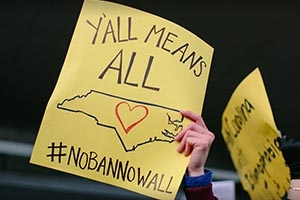Refuge and the American Dream: CAS Doctoral Grad Examines Resettlement Issues
–Gregg Sangillo, May 10, 2017

When Christopher Partridge first wanted to explore refugee resettlement issues, other anthropologists told him this was well-trodden terrain. In 2010-2011, he says, it wasn’t exactly a hot research topic. In addition, people felt that resettlement of refugees in the United States was going well. Why study this further?
Yet as Partridge moved to North Carolina, he had a close-up view of some of the challenges facing new refugees in the U.S. Years later, while concluding his doctoral dissertation on the subject, refugees trying to enter this country became headline news. The Trump administration implemented a controversial measure suspending refugee admission, and Partridge went to the Raleigh-Durham International Airport as protests unfolded.
Partridge recently defended his dissertation, and this spring he’s receiving his Ph.D. in anthropology from American University. But his research—about the difficult and varied experiences of refugees—will live on beyond his time at AU.
“In a space like North Carolina, it’s really important for us to look at the role of community—not just the refugee community, but the current community. How can we help build support out of those spaces?” he asks. “We can’t rely on political will and political whim, and we can’t rely on donor-funded exercises to help refugees. We have to build up these stories of refugee success.”
Resettlement as Development
Partridge not only researched resettlement issues, but volunteered with nonprofit organizations to help refugees. “People are happy to be out of war. They’re happy to be out of catastrophe. But they want something when they come here, and they have a dream of what America is. And that changes during the course of their resettlement. Why and how does it change? That’s what I wanted to find out,” he says.
His research hypothesis was that refugees’ pressing need for early employment tended to depress their long-term career aspirations. Someone might enter the U.S. with strong English skills and journalistic credentials, but unless that person has enough money saved to live for 90 days, they’re forced to take any low-wage job they can find.
“The trauma of resettlement is one that can have lasting impacts, because we’re not doing a great job of investing in people’s livelihoods and their futures,” he explains. “We’re teaching resettlement as an emergency situation, when it really should be looked at as development.”
While his hypothesis was partly confirmed, he underestimated how resilient people can be. A key factor in refugees’ success, he discovered, is ties to the surrounding community.
“If they have community support, even if they have to take that first job at a car wash, they still hold onto that dream of getting back into journalism or getting back into medicine,” he says. “But the people who don’t have that community support often stop reporting these long-term aspirations over time.”
He adds that refugees can help revitalize struggling local economies.
Where the Jobs Are
Changes in the regional economy have had an impact on refugee career prospects. Partridge studied refugees living in the Research Triangle, a fast-growing area with three cities and supporting universities: Durham/Duke University, Chapel Hill/University of North Carolina, and Raleigh/North Carolina State University. There are plenty of service industry jobs there, but pricey apartments and high living costs take their toll.
Earlier, many refugees moved to the Piedmont Triad area, but industries there—such as chicken processing and furniture manufacturing—have waned with automation. While urban professionals might dismiss chicken processing work, those were good jobs where refugees could make between $15-20 an hour, he says.
“[Chicken processors] offer them a lot of incentives that don’t exist in hotel service industries and fast food restaurants, where they aren’t going to give you full-time hours because they don’t want to pay for your health insurance,” he explains.
The Human Connection
He focused on people from countries wracked by war and political violence, such as Burma, Colombia, Democratic Republic of Congo, Iraq, and Somalia. This included a group of refugees who arrived in 2012, and another group from 2015. He observed that the 2012 refugees were more optimistic than the 2015 group, and he partly attributes that to a new political environment that’s less hospitable to immigrants. That’s something he’ll consider researching in greater detail in the future.
“Since I’ve been here, it shifted from a place that was very welcoming to refugees to a place that was getting more of them but becoming increasingly hostile,” he says.
He used pseudonyms to protect refugees’ privacy, but he recalls some remarkable exchanges that resonated with him. One Iraqi man, like Partridge, had a family with a small child. He also remembers an ex-military translator in Afghanistan, who sought to reconnect with the same military friends who helped him get his visa. Partridge witnessed the emotional reunion in a Chick fil-A parking lot at 10:00 p.m. one night.
“That carried me through all the days of watching people’s money run out, or watching people get kicked out of jobs because they didn’t speak the language. You need those moments,” he says. “And then you think, ‘Oh, wow, this is the good stuff. This is why we’re here.’”